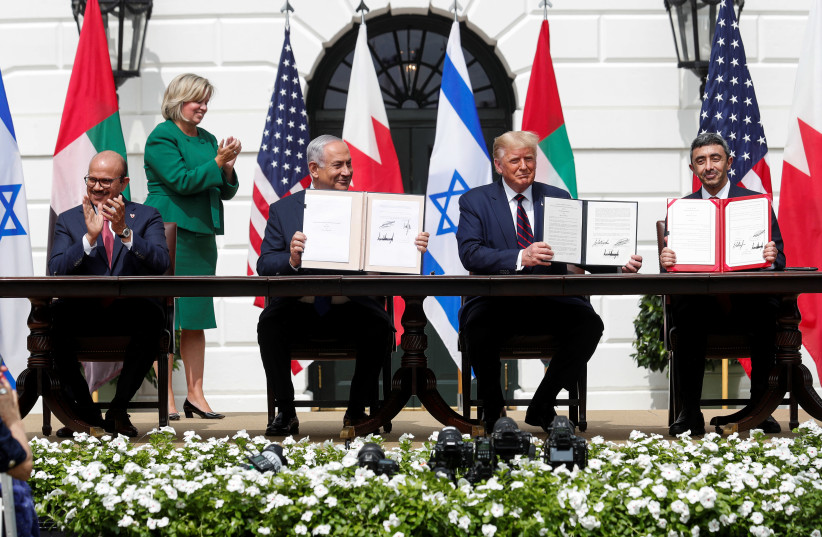“History will judge how this Council responds to this historic moment – it can either shrink from the challenge or rise to the occasion.”

The United Nations Security Council must embrace the Abraham Accords if it wants peace and stability in the Middle East, both Israeli and US envoys urged the international body on Monday.
“This council should embrace the Accords and use them as a catalyst to promote peace and security in the region,” Israel’s Ambassador to the UN Gilad Erdan said. His speech marked the first time he has addressed the UNSC since his arrival in New York to replace former ambassador Danny Danon.
“For decades, many in the international community have fixated on a single solution to the conflict. They vote for the same anti-Israel resolutions, recycle old talking points and ignore issues that are crucial for ending the conflict. They also ignore the fact that this approach has only emboldened Palestinian rejectionism,” Erdan said, during the UNSC monthly meeting on the Israeli-Palestinian conflict.
US Ambassador to the UN Kelly Craft said, “History will judge how this Council responds to this historic moment – it can either shrink from the challenge or rise to the occasion.”
Both envoys spoke in the aftermath of the historic weekend announcement that the US had brokered an agreement between Sudan and Israel to establish ties, under the auspices of the Trump Administration’s Abraham Accords. It follows Israel’s ratification this month of a peace deal with the United Arab Emirates and its pending ratification of a normalization deal with Bahrain.
It’s the first such deals in over 25 years. But rather than enthusiastically laud the agreements, many of the 15 UNSC members took Israel to task for its continued settlement activity and its failure to support a two-state solution at the pre-1967 lines.
Erdan recalled how in the aftermath of the June 1967 Six Day war, the Arab League met in Khartoum where it issued its famous three “nos: No peace with Israel, no recognition of Israel and no negotiations with Israel.”
Last week, Erdan said, “Sudan replaced three “nos” with three yeses: Yes to peace with Israel, yes to a new Middle East and yes to a brighter future for our children. Fifty-three years ago, Sudan symbolized the Arab world’s refusal to accept the Jewish state’s legitimacy. Today, it symbolizes the Arab world’s growing acceptance of the Jewish state.”
Craft said that the Sudan deal was particularly important because the county had in the past harbored enemies of both the US and Israel, such as al-Qaeda affiliates, Hezbollah, and Hamas. “The conversation in the region is changing. As Sudan’s president said, ‘a new chapter is beginning.’”
But the UNSC and the Palestinians must change with it, she said, as she urged the Palestinians to sit down and negotiate with Israel under the auspices of the Trump administration plan to resolve their conflict with Israel. “The table has been set for two, and peace is within reach,” Craft said.
Palestinian Authority Foreign Minister Riad Malki called instead for a UN sponsored international conference to achieve a two-state solution at the pre-1967 lines. PA President Mahmoud Abbas had made a similar call at the UN General Assembly last month. At the UNSC, the Russian envoy said his country has long wanted to host such a Moscow led conference.
Erdan urged the council members not to be “fooled.” He added, “Abbas knows a conference will not bring peace… Prime Minister [Benjamin] Netanyahu has invited President Abbas to Jerusalem many times. He has even offered to go to Ramallah, but Abbas wastes time calling for another useless conference.”
Malki said it was Israel, not the Palestinians who stood in the way of peace.
“It is absurd to claim that it is the Palestinian side that does not want negotiations, when Israel is the one trying, on the ground every single day, to illegally preempt the negotiations on all final status issues,” Malki said.
“It is ludicrous to claim that the obstacle to peace is Palestinian intransigence, when our positions are actually aligned with the international consensus and the resolutions of this Council, while Israeli positions and policies are flagrantly in breach of international law and UN resolutions,” he added.
The only way to ensure peace, Malki said, is for countries to hold Israel accountable by linking the status of diplomatic ties with activity over the pre-1967 lines.
“As long as Israel does not bear the cost of occupation, and instead continues reaping its benefits, it will never negotiate in good faith. The international community must address the shortcomings of the past, by linking its relations with the parties to their respect of their obligations under international law and the peace process, by helping them reach an agreement and implementing it and by enforcing a binding time frame,” Malki said.
Erdan’s speech was marred by a technical glitch that kept his office from operating the video hookup, which would have allowed the UNSC members to see him as he delivered his virtual speech. Instead, he delivered it solely over audio.
Israel’s UN mission was however, able to activate by accident the video hookup during the speech delivered by Malki. As a result the mission’s microphone went on during Malki’s speech, interrupting him with a video shot of an empty chair and an Israeli flag.
As reported by The Jerusalem Post
